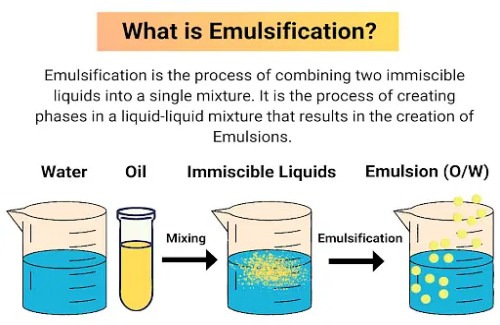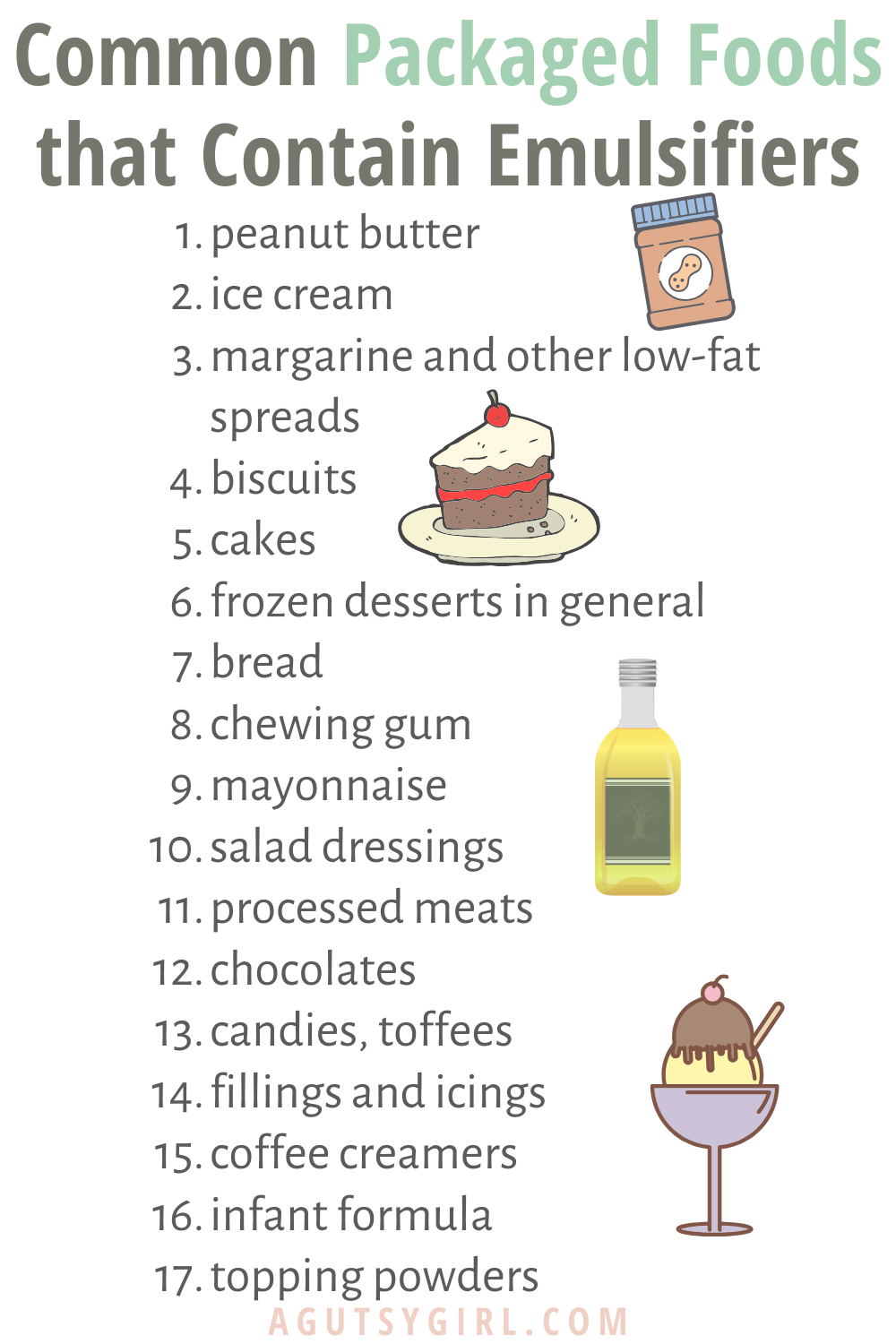How Emulsifiers Are Changing the Game in Clean Label Products
The Science Behind Emulsifiers and Their Importance in Modern Manufacturing
Emulsifiers play a vital duty in contemporary production, acting as the unrecognized heroes that blend oil and water for a large range of items. As consumer choices shift in the direction of cleaner labels, the need for cutting-edge emulsifiers is expanding.
What Are Emulsifiers?
Emulsifiers are important agents in the world of food and product manufacturing, acting as the glue that binds 2 otherwise immiscible liquids, like oil and water. Common examples include lecithin found in egg yolks and soybeans, and mono- and diglycerides made use of in various refined foods.

When you work up a salad clothing or enjoy a creamy dessert, emulsifiers assist keep that perfect texture. They ensure your items have a regular mouthfeel and appearance, boosting your total experience. Without emulsifiers, many foods would separate, resulting in unfavorable structures and flavors. So, following time you appreciate a smooth sauce or spread, bear in mind the unhonored heroes-- emulsifiers-- that make it all feasible.
The Chemistry of Emulsification
When you blend oil and water, you may observe they don't blend quickly; that's where the chemistry of emulsification enters into play. Emulsification occurs when little beads of one fluid disperse in one more, creating a stable mixture. This takes place due to the fact that oil and water are immiscible because of their differing polarities-- water is polar while oil is non-polar. To overcome this obstacle, emulsifiers are used.
These particles have a hydrophilic (water-attracting) head and a hydrophobic (water-repelling) tail. When you add an emulsifier, its particles place themselves at the oil-water interface, decreasing surface area stress and permitting the droplets to mix. The emulsifier creates a protective layer around each bead, stopping them from coalescing back right into separate layers. Understanding this chemistry is essential for accomplishing stability in items like dressings, creams, and sauces, making emulsification important in modern production.
Kinds Of Emulsifiers
Numerous kinds of emulsifiers play vital roles in maintaining blends of oil and water. Natural emulsifiers, like lecithin from egg yolks or soy, are derived from plants and pets, making them popular in food items.
On the other hand, synthetic emulsifiers, such as mono- and diglycerides, are chemically engineered to improve stability and shelf life. They're generally utilized in refined foods and aesthetic products.
In addition, you could encounter non-ionic, anionic, and cationic emulsifiers, each with distinct homes that influence their efficiency. Non-ionic emulsifiers, for instance, work well in a wide variety of pH degrees, while anionic emulsifiers often tend to perform much better in alkaline conditions. Comprehending these kinds can aid you pick the right emulsifier for your particular application.
Devices of Solution Formation
Recognizing how emulsions form is necessary for developing secure mixtures of oil and water. Emulsions occur when you disperse tiny droplets of one fluid right into an additional immiscible fluid, such as oil in water. This procedure calls for power, commonly provided with anxiety or mixing. When you introduce an emulsifier, it decreases the surface tension between both fluids, permitting them to blend more quickly.
The emulsifier particles have a hydrophilic (water-attracting) head and a hydrophobic (oil-attracting) tail. When you add an emulsifier, these particles organize themselves at the oil-water interface. The hydrophilic heads connect with water, while the hydrophobic tails anchor right into the oil. This produces a barrier that maintains the droplets, stopping them from integrating.
Applications of Emulsifiers in Different Industries
Emulsifiers play an essential function across different industries, making your preferred foods smoother and more delightful. In cosmetics, they improve item texture and security, guaranteeing a positive application experience. And also, in pharmaceuticals, they aid deliver necessary ingredients properly, improving general efficacy.
Food Market Makes Use Of
While you might not recognize it, emulsifiers play an important function in the food sector, enhancing the structure, security, and service life of lots of items (Emulsifiers). They're generally discovered in salad dressings, sauces, and mayonnaise, helping to mix oil and water for a smooth, regular item. In baked products, emulsifiers boost dough handling and retain wetness, causing a better structure and prolonged quality. They're additionally important in dairy products, where they support solutions in lotions and ice creams, avoiding splitting up. Also in treats, emulsifiers aid maintain crunchiness and prevent stale flavors. By making sure harmony and top quality, emulsifiers are substantial to supplying the delicious products you take pleasure in everyday, making them an their website indispensable component in contemporary food production.
Cosmetic Formulas Advantages
When it concerns cosmetic formulations, emulsifiers are vital for creating items that really feel extravagant and carry out efficiently. They help mix oil and water, making sure a smooth and steady consistency in lotions, creams, and serums. You'll observe that emulsifiers improve product security, avoiding splitting up and extending shelf life. This suggests you can appreciate your favorite cream without fretting concerning it spoiling too promptly. Furthermore, emulsifiers improve the application experience, permitting even circulation and much better absorption into the skin. By using emulsifiers, you also achieve an even more appealing structure, making your cosmetics feel wonderful on your skin. In general, emulsifiers play a crucial role in providing top notch cosmetic products that satisfy your beauty demands.
Pharmaceutical Applications Overview
In the pharmaceutical market, emulsifiers are crucial for formulating efficient medications. You'll find emulsifiers in different dose forms, like creams, ointments, and fluid suspensions, boosting the bioavailability of medicines.
The Impact of Emulsifiers on Item Top Quality
:max_bytes(150000):strip_icc()/eating-well-emulsifier-dressings-3021330094034a48961553c1a8aea356.jpg)
By making certain steady solutions, you decrease the risk of perishing and extend life span, eventually conserving you time and cash. You'll also locate that emulsifiers can improve the bioavailability of energetic components in your products, making them a lot more efficient for customers.
Furthermore, they allow you to develop cutting-edge formulas that meet diverse customer requirements. Whether you're crafting a creamy dressing or a glamorous cream, emulsifiers are necessary for attaining the desired outcomes. In other words, by understanding and leveraging the effect of emulsifiers, you can substantially raise the top quality of your products.
Future Trends in Emulsifier Development
As the need for cleaner tags and lasting items rises, the growth of brand-new emulsifiers is established to evolve considerably. You'll notice a shift in the direction of plant-based and all-natural emulsifiers, driven by consumer choices for active ingredients that are eco-friendly and much less refined. Innovations in biotechnology will likely boost the performance and effectiveness of these emulsifiers, permitting makers to produce stable solutions with less additives.
You may likewise see a boost in multifunctional emulsifiers that not just maintain emulsions but additionally enhance taste, appearance, or nutritional value. look at here now This trend could streamline ingredient lists while boosting item performance.
Additionally, with advances in nanotechnology, emulsifiers could be engineered at the molecular degree to accomplish unmatched security and performance. Emulsifiers. As you discover these fads, you'll discover that the future of emulsifier growth is not nearly capability, yet also about welcoming sustainability and openness in active ingredients
Frequently Asked Concerns
Are Emulsifiers Safe for Consumption in Food Products?
Yes, emulsifiers are normally secure for consumption in food items. They've been extensively researched and approved by food safety and security authorities, so you can appreciate your favored foods without fretting about their influence on your wellness.
Can Emulsifiers Be Derived From Natural Sources?
Yes, you can obtain emulsifiers from natural sources. Active ingredients like lecithin from egg yolks Discover More or soybeans and casein from milk prevail. These natural emulsifiers aid stabilize combinations without artificial additives, making them prominent in numerous products.

Exactly How Do Emulsifiers Affect Service Life of Products?
Emulsifiers maintain mixes, avoiding separation and perishing - Emulsifiers. By preserving harmony, they prolong items' life span, ensuring quality and top quality. You'll notice that emulsifiers assist keep your favored foods and cosmetics carrying out more than time
What Are Potential Side Impacts of Emulsifiers?
You might experience digestive system concerns when consuming items with emulsifiers, as they can disrupt intestine bacteria. Some researches recommend potential web links to swelling or allergic reactions, however much more study is required to fully understand these effects.

Are There Alternatives to Traditional Emulsifiers?
Yes, there are choices to conventional emulsifiers. You can discover choices like all-natural gums, starches, or lecithin. Each different offers one-of-a-kind buildings, so experiment to discover what jobs best for your details application.